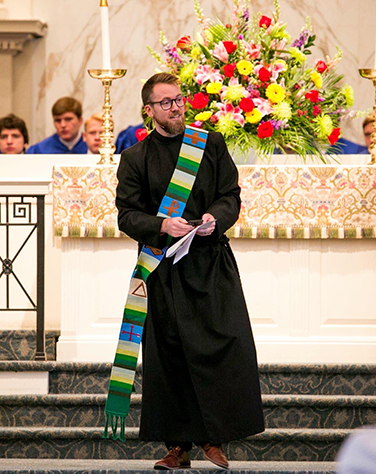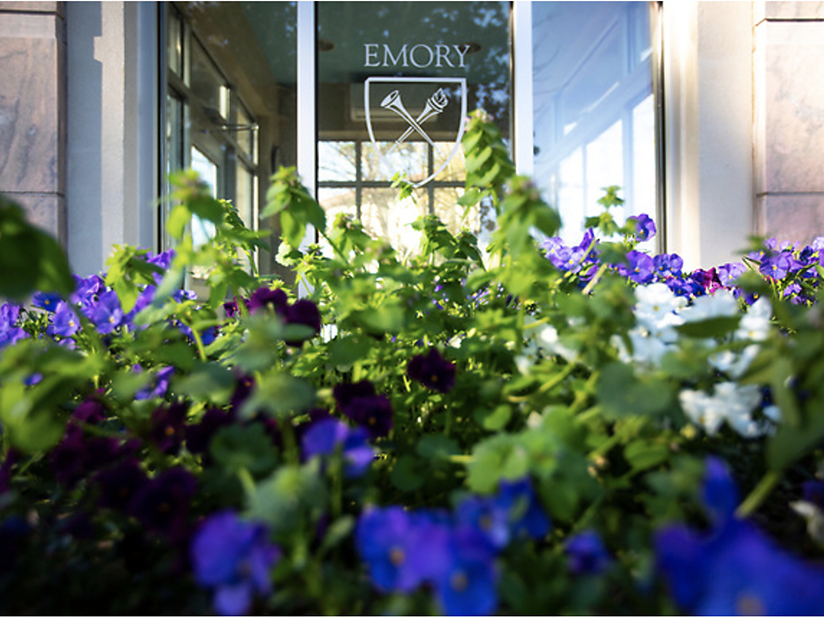Doctor of Ministry Degree Requirements
To qualify for the DMin degree, a candidate must complete each of these requirements.
Candler’s DMin provides the necessary skills to analyze ministry practices through sustained biblical, ecclesiological and theological reflection, and to discern, shape and disseminate new practices in the service of the gospel. The program is designed for working ministry professionals who have received an MDiv and have at least three years of experience. There are four tracks: Biblical Interpretation and Proclamation, Chaplaincy, Church Leadership and Community Witness, and Womanist Discourse.


To qualify for the DMin degree, a candidate must complete each of these requirements.
To enter the DMin program, a candidate must have a:
For each of the DMin tracks, a total of 32 credit hours is required for graduation: 26 awarded for the successful completion of a combination of a course on strategies and resources for online learning, six three-credit classes and related colloquies, and a further six for the successful completion of the final project.
Though course delivery will be predominantly online, all three years will include time on Candler’s campus. In the first year, this will involve general orientation and meeting cohort members in the fall. In the third year, the fall visit is constructed to help equip students for the design of their final project and the spring Festival of Learning includes formal presentation and review of the final project. One further residential component falls in the middle of the second year: a track specific residential course offered in the January term.
DMin students will be assigned a mentor who will assist in designing the final project required for the degree. Courses in each track are structured so students make steady progress on the project’s planning and design throughout the program.
The heart of the final project consists of crafting an innovation in ministry practice in the student’s location of choice. The design will build upon the issues and questions that arose during coursework, and the final product will serve as an ideal example of how Candler prepares real people to make a real difference in the real world.
Some past sample final projects:
The DMin is designed to be completed in three years. In extraordinary circumstances, a student may be allowed to complete the Final Project during a fourth year. When such a program extension is granted, a student enrolls in DM799– Doctor of Ministry Library Use and must pay the residency fee (currently $85 per semester) as well as other mandatory student fees for the fall and spring semester of the fourth year. Projects are then presented at the Festival of Learning at the end of the fourth year.
The DMin program offers four tracks:
The Biblical Interpretation and Proclamation track will help graduates achieve a theology of Scripture they can use in ministerial practice.
The Chaplaincy track will help graduates achieve the practical and theological skills needed to become leaders in the field.
The Church Leadership and Community Witness track is geared toward students interested in models of ministerial leadership.
The Womanist Discourse track will help students learn how to engage in womanist discourse with a lived reality, with the competencies to lead communities of faith through the present social crises.
All tracks are designed to enhance students’ competence in congregational analysis, integrating theology and practice, sharing best practices in ministry, and facilitating collaboration.
Year One
DM500. Strategies and Resources for Online Learning (August Intensive; Online and Residential)
DM700. Becoming a Reflective Practitioner (fall)
DM701. First Year Colloquy I (fall)
DM702. First Year Colloquy II (spring)
DM721. Scripture, Theology, Practice (spring)
Year Two
DM703. Second Year Colloquy (fall and spring)
DM722. Issues in Old Testament Interpretation (fall)
DM723. Teaching as a Practice (January Intensive; Residential)
DM724. Issues in New Testament Interpretation (spring)
Year Three
DM704. Final Project Colloquy (fall and spring)
DM725. Preaching the Bible (fall)
DM750. Doctor of Ministry Final Project (spring)
Year One
DM500. Strategies for Online Learning (August Intensive; online and residential)
DM700. Becoming a Reflective Practitioner (fall)
DM701. First-Year Colloquy I (fall)
DM702. First-Year Colloquy II (spring)
DM781. Interreligious Spiritual Care (spring)
Year Two
DM703. Second-Year Colloquy (fall and spring)
DM782. Fundamentals of Compassion-Based Spiritual Care and Health I (fall)
DM783. Trauma-Informed Spiritual Care (January Term Intensive; residential)
DM784. Reading Lives: Narrative and Identity Formation (spring)
Year Three
DM704. Final Project Colloquy I (fall and spring)
DM785. Fundamentals of Compassion-Based Spiritual Care and Health II (fall)
DM750. Doctor of Ministry Final Project (spring)
Year One
DM500. Strategies and Resources for Online Learning (August Intensive; Online and Residential)
DM700. Becoming a Reflective Practitioner (fall)
DM701. First Year Colloquy I (fall)
DM702. First Year Colloquy II (spring)
DM711. Understanding Community (spring)
Year Two
DM703. Second Year Colloquy (fall and spring)
DM712. Ecclesiologies in Action (fall)
DM713. Leadership as a Practice (January Intensive; Residential)
DM714. Leadership and Witness 1: Cultivating Church (spring)
Year Three
DM704. Final Project Collquy (fall and spring)
DM715. Leadership and Witness 2: Engaging the World (fall)
DM750. Doctor of Ministry Final Project (spring)
Year One
DM500. Strategies for Online Learning (August Intensive; online and residential)
DM700. Becoming a Reflective Practitioner (fall)
DM701. First-Year Colloquy I (fall)
DM702. First-Year Colloquy II (spring)
DM771. Womanist Readings of the Bible and Indigenous Stories (spring)
Year Two
DM703. Second-Year Colloquy (fall and spring)
DM772. Womanist Preaching and Sacred Rhetoric (fall)
DM773. Womanist Ritual Performance (January Intensive; residential)
DM774. Womanist Social Leadership and Ethics (spring)
Year Three
DM704. Final Project Colloquy I (fall and spring)
DM775. Womanism and Soul Care (fall)
DM750. Doctor of Ministry Final Project (spring)